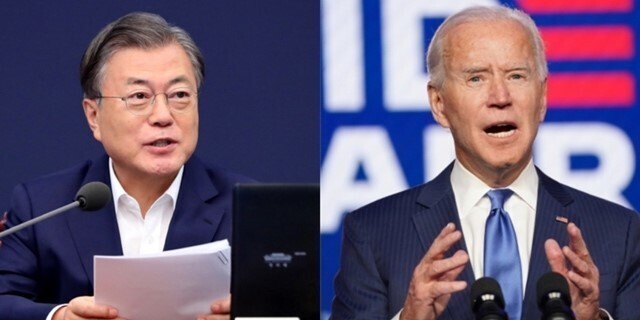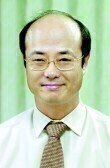hankyoreh
Links to other country sites 다른 나라 사이트 링크
[Column] The fate of the Korean Peninsula should be decided by Koreans

The US is likely to get a new president. With the world’s superpower under new leadership, what changes are in store for the Korean Peninsula? There’s no telling — not even Joe Biden himself knows for sure.
On Oct. 29, Yonhap News ran a column in which Biden appealed for the support of two million Korean-Americans. His column only contained a single sentence about Korean Peninsula policy: “I’ll engage in principled diplomacy and keep pressing toward a denuclearized North Korea and a unified Korean Peninsula.”
The column didn’t say anything about what Biden means to do, or how he intends to do it. That’s hardly a surprise. This is when he has to start hashing out the details with his foreign policy and national security advisors. The Korean Peninsula isn’t one of Biden’s top priorities.
South Korean government officials and lawmakers from the ruling and opposition parties are rushing to line up flights to the US. They’re also anxious to brag about their connections with Joe Biden or his aides.
It’s embarrassing, actually. I wish they’d show a little restraint. Whom do they plan on meeting in the US? If they do have a conversation with someone, will it be effective? Probably not.
Biden hasn’t even started working on the presidential transition. Trump doesn’t seem keen on conceding without a fight.
What Koreans ought to do right now is fine-tune arguments and solutions capable of persuading the next president and his advisors when the time is right.
That means making sure North Korea doesn’t abruptly test a nuclear weapon or shoot off any missiles in order to grab the attention of the new president. On the domestic front, that also means coordinating the messaging of the government and the ruling and opposition parties so that no one starts running their mouth.
The US can’t ignore South Korea on the Korean Peninsula. For one thing, we’re one of the principals there; for another, we’re a military ally. American experts on the Korean Peninsula are much less knowledgeable about the peninsula than Koreans realize.
Biden doesn’t know much about the Korean Peninsula either, and he’ll have to work closely with South Korean President Moon Jae-in. It’s not only Biden, though; that’s been generally true of past American administrations.
Clinton told Kim Dae-jung to take charge of inter-Korean affairs, saying he’d sit in the passenger seatWhen former South Korean President Kim Dae-jung visited the US in 1998, US President Bill Clinton asked him to explain his North Korean policy. Kim said that he’s actually based his signature Sunshine Policy on the lessons of American successes. He noted how the US’ policy of conciliation had caused the Soviet Union to collapse and China and Vietnam to open up.
Clinton responded by saying that, given Kim’s gravitas and experience, Kim ought to take the lead on Korean Peninsula issues. Clinton said that Kim should take the steering wheel and offered to hop over to the passenger side and play a supporting role.
Clinton appointed former Secretary of Defense William Perry to serve as his North Korean policy coordinator. Perry was a hardliner who’d prepared for all-out war with the North during the first nuclear crisis in 1994 and advocated launching a strike on the North’s Yongbyon nuclear complex.
Kim Dae-jung and Lim Dong-won, Kim’s senior secretary for foreign policy and national security, worked tenaciously to win Perry over to their position. The “Perry Process” document, completed in September 1999, stated that, if the US received North Korean cooperation on ending its nuclear and missile threats, the US would have to be willing to normalize relations with the North and establish diplomatic relations.
The first inter-Korean summit was held in 2000. North Korean Vice Marshal Jo Myong-rok visited the US, and US Secretary of State Madeleine Albright paid a visit to the North.
Clinton’s priorities in the Middle East squandered opportunity for inter-Korean peaceThe reciprocal trips were supposed to lay the groundwork for a visit by Clinton himself. But Clinton got caught up in peace negotiations in the Middle East and didn’t get around to going before the end of his presidency. Thus was squandered an opportunity for peace on the Korean Peninsula that had been two years in the making.
We’ve also seen the exact opposite situation play out. The US policy toward the Korean Peninsula during the presidency of Barack Obama was “strategic patience.” Obama basically took a hands-off approach to North Korea’s development of nuclear weapons.
The Obama administration’s “strategic patience” policy was closely linked to the hardline stance toward North Korea adopted by South Korean presidents Lee Myung-bak and Park Geun-hye. When inter-Korean relations are poor, North Korea-US dialogue runs aground as a matter of course.
In 2018, the winds of peace began to blow once more on the Korean Peninsula. Moon managed to simultaneously persuade North Korean leader Kim Jong-un and US President Donald Trump to give it another try.
This time, the obstacle was the US’ military-industrial complex, whose stakeholders didn’t want peace on the Korean Peninsula. John Bolton, Trump’s advisor, sabotaged the negotiations.
No way to know Biden’s policy stance in advanceThe 2020 presidential election in the US is nearing its end. For now, there’s no way to know whether Biden, if officially elected president, will revert to the “strategic patience” of the Obama era or whether he’ll carry on the progress made in Trump’s negotiations with North Korea. It would be rash to jump to conclusions.
The important thing is that the South Korean government and Moon take the initiative. We need to proactively make our case to North Korea, the US, and the international community.
That’s the only scenario under which North Korea gives up its nuclear weapons, the international community eases sanctions on the North, and the US establishes diplomatic relations with the North. After all, the Korean Peninsula belongs to the Korean people.

By Seong Han-yong, senior staff writer
Please direct comments or questions to [english@hani.co.kr]

Editorial・opinion
![[Editorial] Penalties for airing allegations against Korea’s first lady endanger free press [Editorial] Penalties for airing allegations against Korea’s first lady endanger free press](https://flexible.img.hani.co.kr/flexible/normal/500/300/imgdb/original/2024/0502/1817146398095106.jpg) [Editorial] Penalties for airing allegations against Korea’s first lady endanger free press
[Editorial] Penalties for airing allegations against Korea’s first lady endanger free press![[Editorial] Yoon must halt procurement of SM-3 interceptor missiles [Editorial] Yoon must halt procurement of SM-3 interceptor missiles](https://flexible.img.hani.co.kr/flexible/normal/500/300/imgdb/child/2024/0501/17145495551605_1717145495195344.jpg) [Editorial] Yoon must halt procurement of SM-3 interceptor missiles
[Editorial] Yoon must halt procurement of SM-3 interceptor missiles- [Guest essay] Maybe Korea’s rapid population decline is an opportunity, not a crisis
- [Column] Can Yoon steer diplomacy with Russia, China back on track?
- [Column] Season 2 of special prosecutor probe may be coming to Korea soon
- [Column] Park Geun-hye déjà vu in Yoon Suk-yeol
- [Editorial] New weight of N. Korea’s nuclear threats makes dialogue all the more urgent
- [Guest essay] The real reason Korea’s new right wants to dub Rhee a founding father
- [Column] ‘Choson’: Is it time we start referring to N. Korea in its own terms?
- [Editorial] Japan’s rewriting of history with Korea has gone too far
Most viewed articles
- 160% of young Koreans see no need to have kids after marriage
- 2Presidential office warns of veto in response to opposition passing special counsel probe act
- 3Months and months of overdue wages are pushing migrant workers in Korea into debt
- 4[Reporter’s notebook] In Min’s world, she’s the artist — and NewJeans is her art
- 5[Editorial] Penalties for airing allegations against Korea’s first lady endanger free press
- 6Japan says it’s not pressuring Naver to sell Line, but Korean insiders say otherwise
- 7OECD upgrades Korea’s growth forecast from 2.2% to 2.6%
- 8Hybe-Ador dispute shines light on pervasive issues behind K-pop’s tidy facade
- 9Inside the law for a special counsel probe over a Korean Marine’s death
- 10At heart of West’s handwringing over Chinese ‘overcapacity,’ a battle to lead key future industries